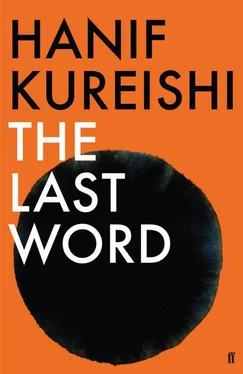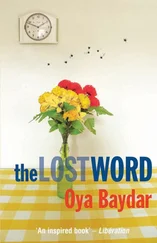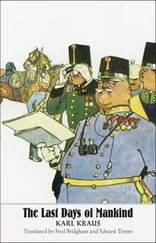She informed him, the second time she saw him, as they strolled in the sunshine in his favourite place, the Villa Borghese, that she had fallen in love with his primal creative power. He was relieved. He was parched. He took her to dinner. She wore her blue lace skirt. She had never had a dark man. They made love with their eyes. He played the man part well, and invited her to his bed. Though he was a little older than she was used to, what could she do but open herself to him? She was pleased that he was not just a talker like some clever men. In her experience intellectuals were not sufficiently devoted to sex, with weak erections and watery, even frothy semen. But Mamoon undressed her slowly, he knew how to look at her body and let her show herself to him; he knew what to say about a woman. He kissed and caressed her feet, and had her at least three times.
In the morning he kissed her coffee mouth. He said he loved that taste on her, of bitter black coffee. She had happily stayed in his arms ever since.
‘God didn’t grant me children, Harry, but He granted me Mamoon when I thought it might be too late! For a time, I could come just by thinking of him. Can’t we throw Peggy and her diaries away and live the life of the living? I am Tolstoy’s wife: it is like running an estate, this place!’
‘Did Mamoon read the diaries?’
‘Why, are they so shocking?’ She said, ‘He wasted his life attending to that poor woman who killed herself just to spite him. Why would he want to fritter away another moment on such a spoilt and sullen creature?’
‘He acknowledges in interviews that the two of them worked together on his manuscripts. She was the only person who wasn’t afraid to edit him.’
‘See how kind he is, praising her when we know the truth — that it was obviously all his work!’
Harry said, ‘Perhaps she was like the Beatles with George Martin — impossible to subtract from the work.’
‘Please, stop these stupid distractions. You know we are in need of a career boost up. I can tell you, to help the finances even more, I am going to write my own book. If I let you see some of it, you can offer advice.’
‘I’d love to. But Liana, I must speak to Mamoon if I’m to make a picture of him alive, here and now. Otherwise I think I will pack right up and go home at the weekend.’
‘ Acha , tonight then,’ she said.
They would have a proper supper and Harry would join them.
At seven thirty a bell was rung downstairs. Harry left his work. He learned that Liana liked the round supper table by the window to be properly laid with crisp napkins, shining cutlery, candles, and the best champagne and wine. She was in jeans and a V-neck jumper, and Mamoon wore a fresh shirt. When Harry entered, Liana glared disapprovingly at his raggedy T-shirt, which he would be sure never to wear again, or would perhaps incinerate. Their housekeeper, Ruth, who had veined arms and a grey, bitter mouth, and was wearing black with a white apron, served them silently. Her sister was cooking.
Harry had heard from Rob that being merely a literature lover, Liana had had inflated ideas about Mamoon’s standing and wealth, with little notion of what the life of a professional writer was like. She’d been shocked by how modest an income his books actually generated. A small but lofty reputation didn’t translate into cash. Her accountants had told her that unless things improved, the couple would, in the near future, have to sell the house and land and move somewhere smaller. ‘Perhaps to the lowest of the low, Harry — even a bungalow!’
It became clear that Liana had convinced herself that the solution to this was for Mamoon to become, as she put it, ‘a brand’. Harry was amused to learn that Mamoon, who said little at supper, appearing to park his mind somewhere more congenial and with a better outlook, wasn’t sure what being a brand entailed.
‘Brand, did you say, darling habibi ? Would I have to become like Heinz ketchup or a Mont Blanc pen?’
‘Not ketchup, no, but more like brand Picasso,’ she said. ‘Or Roald Dahl. Crowds of people are in and out of that dismal little shed every five minutes, paying through the nostrils.’ When Mamoon pointed out that Dahl was long dead, Liana said, ‘Never mind that — he is alive in people’s minds. We must sell you better so you are similarly alive.’ She nodded at Harry. ‘This biography will be a good start. Don’t we quite like nice Harry?’
‘The boy has a powerful forehand.’
‘Mamoon, I have to remind you over and over that you haven’t been fairly remunerated for your genius. I go to meetings with our accountants and I can tell you, they may not have read your books, but they have looked at your figures and sighed.’ She took his hand, kissed it, and rubbed it against her neck. ‘Darling, an essay on Tagore won’t repair the jacuzzi.’
Mamoon winced and leaned forward. ‘We have a jacuzzi?’
At least Liana was trying — to sell the film rights to his books; to use Mamoon’s contacts to set up a cookery programme for herself; and to persuade him to give a lucrative lecture tour in the US. She was also intending to ‘pen’, as she put it, a novel about a beautiful, Italian woman who falls in love with a genius. Harry would, he’d been informed, help her with this task. Who these days, apart from old-fashioned Mamoon, bothered to write their own novels, any more than they designed their own houses? Would Harry read what she’d done so far and make suggestions?
Harry got up and went out into the yard for a smoke. Liana followed him, saying, ‘Why did you make that distasteful face in my house? Mamoon lives in a dream world! If I didn’t protect him, he’d be broke. Don’t forget you’re here to show the world what an artist is.’
‘That’s what I’m trying to do.’
‘You know, Harry, I get a little tired of you sniffing around listening, suddenly coming up with a sly question about what happened whenever and why. Let me ask you a question. How many bedrooms were there in the house you grew up in?’ When he hesitated she went on, ‘There you are. You can’t remember. Five? Six?’
‘It was a Norman Shaw house, in Bedford Park, in Chiswick, West London. They were a bit run down. Dad sold it when I went up to Cambridge. Silly really, as those houses are worth millions now and film stars live there.’
‘But your father was a surgeon.’
‘He was a doctor, and became a psychiatrist, working first in an asylum and then in a hospital.’
‘ Salaud — never mind that! Mamoon and I have had to work like dogs to achieve all that we have, while you were brought up in the top one per cent of the world’s population. In another time, Harry, you’d have become a politician, a diplomat, an economist or a banker. What went wrong?’
‘It’s all gone right. We were brought up to feel at ease with mad people. Dad would invite his former patients over to the house. Some stayed with us. Dad encouraged us to follow them into their delusion, which he called their story, the narrative which held them together. What was called their madness was really their writing.’
‘What has this got to do with my husband?’ she said.
At one time, he explained, while the Left was railing against imperialism and American influence, and often supporting Third-World fascists, Mamoon interviewed and wrote about powerful politicians, dictators and bearded mass murderers who had, on occasion, personally beheaded their enemies that morning — men who wrote their ‘novels’ in the blood of the people. Mamoon understood this to be a form of story-telling, the making of history by writing. His voice was cool, never judgemental but morally firm. He understood the need for dictators, prophets and kings, and our love for them. ‘And anyway, Liana,’ Harry went on, ‘while we’re talking about my family, my long dead mother ran a bookshop for a time.’
Читать дальше












